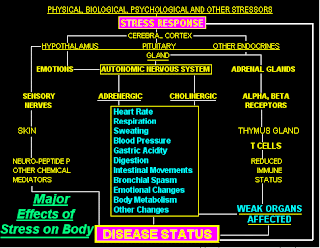With the hustle and bustle of everyday life, some may feel that it is hard to live stress free. You have your family, friends; work, bills errands, etc.; with never enough time in the day to get it all done. A chaotic environment is a breeding ground for stress. Too much stress can cause psychological and physical damage, leaving your body vulnerable to different ailments and diseases.
Risk factors associated with stress:
Acne
Depression
Migraines
Insomnia
Mood swings
Heart disease
Weak immune system.
Sexual Dysfunction
Hypertension
Nervous breakdown
Tension headaches
Stomach problems
Weight gain
Mental burnout
Many of the effects of stress on mind and body are due to increased sympathetic nervous system activity and an outpouring of adrenaline, cortisol and other stress-related hormones.
Certain types of chronic and more insidious stress due to loneliness, poverty, bereavement, depression and frustration due to discrimination are associated with impaired immune system resistance to viral linked disorders ranging from the common cold and herpes to AIDS and cancer.
Stress can have effects on other hormones, brain neurotransmitters, additional small chemical messengers elsewhere, prostaglandins, as well as crucial enzyme systems, and metabolic activities that are still unknown.
Now that we know the causes and risk factors associated with stress, here are some stress maintenance tips:
Recognize the problem
Avoid comfort food
Eating right/exercise
Get more sleep
Listen to music
Make time for fun
Make time for you
Learn to let go
Learn to prioritize
Learn to relax your mind/body
Learn how to express your feelings
Serotonin is one of the neurotransmitters in our body that makes us feel good, which is why we tend to crave sugars in a carbohydrate comfort food.
Some great stress busters are:
Breathing exercises: The way you breathe affects your whole body. breathing exercises are a good way to relax, reduce tension, and relieve stress.
Yoga: Manage stress with yoga; learn relaxation yoga poses in this free instructional video on how to relieve stress with yoga poses and stretches.
Meditate. When you meditate, you focus your attention on things that are happening right now. Paying attention to your breathing is one way to focus. For more information
Write: It may help to write about things that are bothering you. Write for 10 to 15 minutes a day about stressful events and how they made you feel. Or think about starting a stress journal. This helps you find out what is causing your stress and how much stress you feel. After you know, you can find better ways to cope.
Read more:http://www.webmd.com/balance/stress-management/stress-management-relieving-stress
By understanding the causes/effects of stress and following the tips giving, can assist in long term stress maintenance. Stress is a silent killer – Take back your life, kick stress to the curb, learn to live life and not just exist in it!
YOU CAN DO IT!

